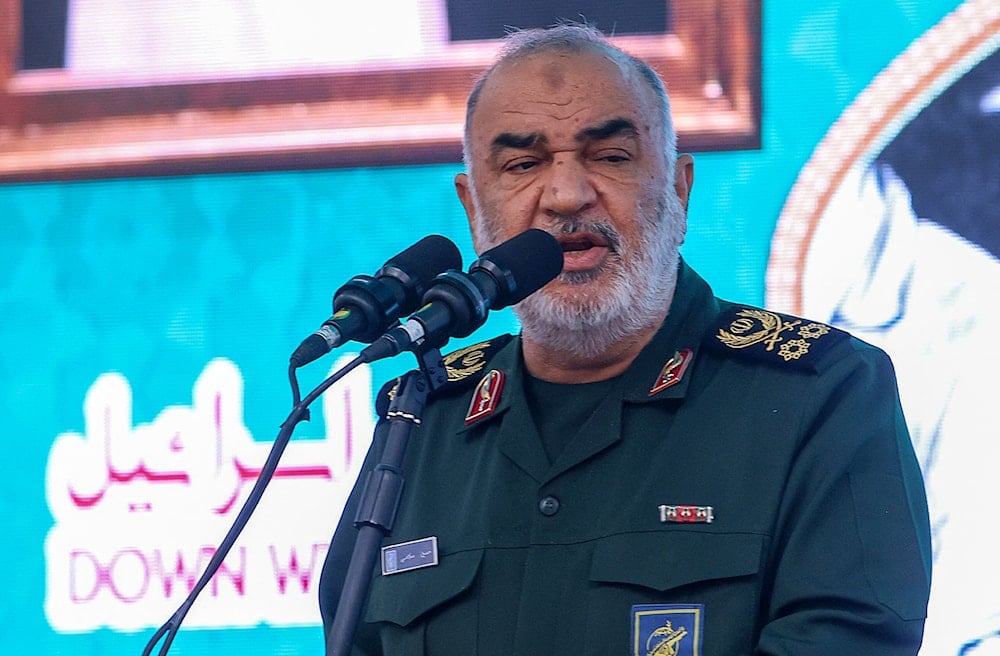IRGC Commander hails Hezbollah resilience in face of Israeli regime
Iran's IRGC Commander commends the "miraculous revival" of Hezbollah, as the IRGC continues to foil western terror plots in border regions.
-

The commander-in-chief of Iran's Islamic Revolution Guard Corps (IRGC), Major General Hossein Salami, speaks during a rally outside the former United States embassy in Tehran, Iran, on November 3, 2024. (AFP)
The commander-in-chief of Iran's Islamic Revolution Guard Corps (IRGC), Major General Hossein Salami, hailed during a meeting with the Assembly of Experts of Iran, on Wednesday, Hezbollah's resilience and confrontation of the Israeli regime.
Salami said the Israeli regime was mistaken to believe that assassinating Hezbollah's commanders and leaders would limit the Resistance group's capabilities.
Hezbollah has come back miraculously in spite of the losses and bitter and successive blows, the IRGC Commander told top Iranian officials. Noting Hezbollah's continued repulsion of Israeli aggression, Salami said the Resistance in Lebanon is standing heroically against the Israeli regime and that it is in control of the situation.
The general also pointed to other related regional developments.
Salami said Operation Al-Aqsa Flood conducted by the Palestinian Resistance, which he called tactical, shortened the interval of the Israeli regime's strategic defeat.
He explained that regional equations are changing on a daily basis in favor of the Axis of Resistance. The IRGC Commander also described Iran as a world-class power at present, saying the Islamic Republic has stood against "the arrogant powers," in reference to some Western governments and the Israeli regime.
Read more: Quds Force commander congratulates Sheikh Qassem, voices solidarity
IRGC continues fight against terrorism on eastern borders
On the domestic front, the Deputy Commander of the IRGC Quds Headquarters, Brigadier General Ahmad Shafahi, confirmed that the force continues to fight terrorism in its eastern borders and in the Sistan and Baluchestan province with the participation of other security agencies.
He said that these efforts aim to clear "these areas of terrorists" and enhance security.
Shafahi said the majority of weapons used by such terrorists in eastern provinces are Western-made, specifically American-made. He explained that this is part of the West's strategy to cause instability in Iran.
In this context, Iranian Foreign Minister Abbas Araghchi and his Pakistani counterpart, Ishaq Dar, held talks regarding terrorist movements in the border region of Sistan and Baluchestan.
Both sides emphasized their determination to intensify efforts to confront terrorist groups and increase coordination in this regard.
Earlier on November 3, the spokesperson for the Iranian police, Brigadier General Montazeri Mahdi, announced that "the leader of the terrorist cell responsible for the attack on Iranian security forces in the Taftan area of Sistan and Baluchistan province has been eliminated."
He further stated that in 24 hours, six individuals who assisted the terrorists had been arrested.
Iranian news agency Tasnim reported that the IRGC launched a drill in the province where four terrorists were killed and others detained. Among those detained was a prominent member linked to an October 26 attack on police in Taftan, which killed 10 servicemen.
Read more: Iraq clearing border from terrorist groups ahead of Pezeshkian visit

 3 Min Read
3 Min Read








